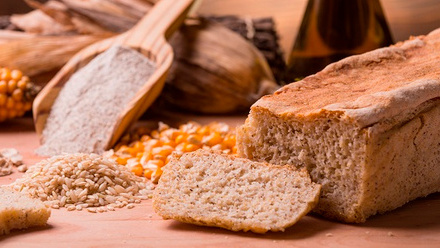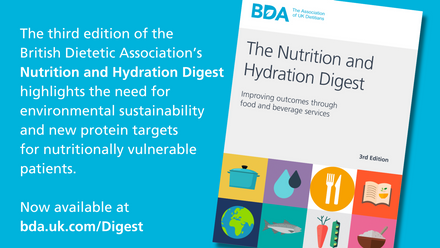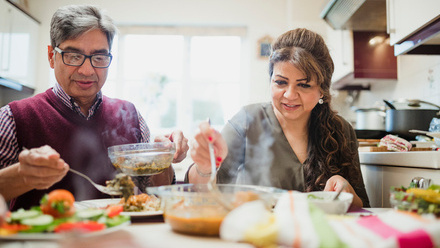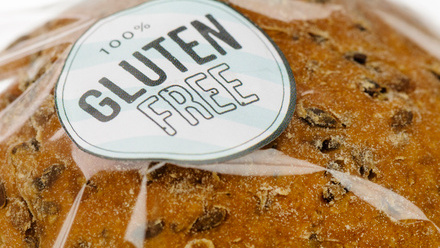This Coeliac Awareness Month we take a look at what dietitians are doing in Bradford to make things better for their coeliac inpatients.
What is coeliac disease and what are the symptoms?
Coeliac disease (CD) is a life-long autoimmune condition triggered by gluten ingestion in genetically predisposed individuals.1 The only available treatment is a gluten-free diet (GFD), which includes predominantly removing the gluten-containing grains barley, rye and wheat from the diet.
When people with CD consume gluten, they can experience a wide range of digestive and non-digestive symptoms. These symptoms can be abdominal pain, bloating, unexplained weight loss, nausea, vomiting, brain fog, mouth ulcers, vitamin and mineral deficiencies, chronic fatigue, headaches and many others.2
In addition, it takes very small amounts of gluten (10-50mg) to cause damage to the gut,3 and this is why it is advised that gluten-cross contact is also avoided, meaning that individuals should prevent gluten from coming into contact with gluten-free food during the cooking, handling, and manufacturing process, for foods to be truly gluten-free.
Why is a gluten-free diet important?
Currently, the GFD is the only available treatment for CD. There is no medication available or alternative treatment someone can take to allow them to eat even small amounts of gluten.
This can make living with CD very debilitating and challenging, as it requires constant and thorough awareness of label checking for gluten, ensuring gluten is avoided at home, as well as ensuring any meals prepared by anyone else do not have gluten in them and are not a risk of gluten cross-contact in the cooking or handling process.
Therefore, anyone providing food to somebody living with CD needs to have an awareness of this and have measures in place to ensure food provided is suitable and safe.
Why is hospital nutrition and coeliac disease in the media?
It is often assumed that hospitals are places where any patient with any medical condition can recover and get better, whilst having nourishing meals to help improve their recovery. However, recent media reports have highlighted an incident where someone with a CD diagnosis was mistakenly fed gluten in hospital multiple times, and this has then led to adverse events.
Whilst this may sound like an isolated incident, many hospitals do not have sufficient mechanisms in place to ensure staff are always aware of the needs of people with CD (or allergies and intolerances) and there are often not robust enough mechanisms to ensure that hospital meals are consistently safe and free of gluten-cross contact from the point of cooking in the hospital kitchen to the point of food delivery at ward level.
What should hospital nutrition for coeliac disease look like?
Food and drink provision in hospitals is required to meet the needs of all patients. The BDA Nutrition and Hydration Digest details how these needs should be met, including the safe management of patients with food hypersensitivity (CD, food intolerance and food allergy).
Patients need to be screened on admission for food hypersensitivity and flagged, such as on medical records, beds, and handovers, to minimise the risk of patients being given unsafe food.
As food providers, hospitals must ensure that the allergen content of all the food and drink offered on the premises is known and easily accessible to help patients, visitors and staff make informed and safe decisions.
For those patients with food hypersensitivity, alternative free from foods of suitable nutritional content need to be made available where possible.
Foods that have no gluten-containing ingredients may be available, but not all can be classified as gluten-free (due to not being tested to contain no more than 20ppm gluten), which renders them unsuitable for those presenting with CD.
Consideration needs to be made regarding the variety and suitability of gluten-free provision, and this typically requires a separate gluten-free offering to best meet nutritional requirements.
To ensure this food remains safe for consumption, all staff and volunteers need to be aware of food hypersensitivity, food hygiene, and the procedures and processes to follow. This guidance should be provided via Trust policy and training.
What can dietitians do to make this better?
Dietitians play a vital role in CD management, being able to provide both clinical expertise and practical management support to both patients and colleagues.
Dietitians should aim to continue building relationships between catering and clinical services to ensure safe management is adopted throughout the food and healthcare journey.
Practically, this can involve supporting the design and delivery of training, policies, and procedures and assessing the suitability of gluten-free options' nutritional content.
Dietetic input is also needed in planning and reviewing gluten-free food provision to ensure that the overall menu is suitable for meeting the needs of both nutritionally well and vulnerable patients, as outlined in the BDA Nutrition and Hydration Digest.
What have we done in Bradford to make things better for our coeliac inpatients?
Following the successful business case and recruitment of a catering dietitian in Bradford, work has commenced aiming to achieve gluten-free accreditation from Coeliac UK and, by doing so, flagged areas for improvement to better assure the safety of providing gluten-free hospital meals.
Exploring the accreditation highlighted training as a key area that could be improved to build awareness and knowledge of the differences in management between CD, food allergy and food intolerances.
To support this, a mandatory e-learning module for all hospital staff and a separate food hypersensitivity policy is being developed to stand alongside current hazard analysis, critical control points and the Trust food hygiene policy. Once training and policies are established, better assurance can be provided to patients that the foods they receive are gluten-free, therefore minimising the risk of accidental exposure to gluten.
Progress in all these areas further emphasises the importance of Trusts establishing their own business cases for catering dietitians due to the existing pressures and demands on clinical dietitians.
Conclusion
The unfortunate news shared in a recent media article has highlighted the training management gaps that many hospitals have when it comes to providing safe gluten-free meals for people living with CD.
Dietitians have a key role in helping to improve this by building relationships with catering departments and designing adequate training and policies to ensure necessary safeguards are in place to provide gluten-free hospital meals.
The work we have undertaken at Bradford so far has shown the value of having protected time through a catering dietitian to develop the right training and policies so our hospital can offer reassurance to patients whilst also striving to achieve the Coeliac UK gluten-free accreditation.
References
- Ludvigsson, J. F., Leffler, D. A., Bai, J. C., Biagi, F., Fasano, A., Green, P. H., Hadjivassiliou, M., Kaukinen, K., Kelly, C. P., Leonard, J. N., Lundin, K. E., Murray, J. A., Sanders, D. S., Walker, M. M., Zingone, F., & Ciacci, C. (2013). The Oslo definitions for coeliac disease and related terms. Gut, 62(1), 43–52.
- Lindfors, K., Ciacci, C., Kurppa, K., Lundin, K. E. A., Makharia, G. K., Mearin, M. L., Murray, J. A., Verdu, E. F., & Kaukinen, K. (2019). Coeliac disease. Nature reviews. Disease primers, 5(1), 3.
- Catassi, C., Fabiani, E., Iacono, G., D'Agate, C., Francavilla, R., Biagi, F., Volta, U., Accomando, S., Picarelli, A., De Vitis, I., Pianelli, G., Gesuita, R., Carle, F., Mandolesi, A., Bearzi, I., & Fasano, A. (2007). A prospective, double-blind, placebo-controlled trial to establish a safe gluten threshold for patients with celiac disease. The American journal of clinical nutrition, 85(1), 160–166






